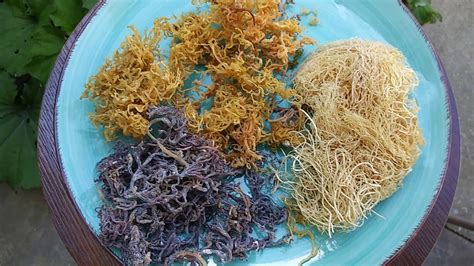Sea Moss: Time to See Real Results
Sea moss, or Irish moss, has surged in popularity as a nutritional powerhouse. But beyond the hype, are the purported benefits real? This comprehensive guide dives deep into the science and anecdotal evidence surrounding sea moss, helping you determine if it's time to see real results in your health and well-being. We'll explore its nutritional profile, potential benefits, how to use it, and important considerations before incorporating it into your routine.
What is Sea Moss?
Sea moss ( Chondrus crispus) is a type of red seaweed harvested from the Atlantic Ocean. It's a sustainable and renewable resource, and for centuries, coastal communities have utilized its rich nutritional profile. Unlike many supplements, sea moss boasts a natural array of vitamins and minerals, making it a compelling addition to a healthy diet.
Nutritional Powerhouse: What's Inside?
Sea moss is a nutritional powerhouse, packed with essential vitamins and minerals. It's a particularly good source of:
- Minerals: Rich in iodine, potassium, magnesium, calcium, and iron, vital for various bodily functions.
- Vitamins: Contains vitamins A, C, and K, contributing to immune function and overall health.
- Antioxidants: Sea moss is loaded with antioxidants that fight free radicals, protecting cells from damage.
- Fiber: Supports healthy digestion and gut function.
This rich composition makes sea moss a potential boon for various aspects of health, but let's explore the claims more thoroughly.
Potential Benefits of Sea Moss: Fact vs. Fiction
Many claims surround sea moss benefits. While more research is needed to definitively confirm all claims, some show promising potential:
Improved Immune Function:
The high concentration of vitamins and minerals in sea moss supports immune function. Vitamins A and C are known antioxidants which bolster the immune system’s defense against infection.
Enhanced Thyroid Health (with caution):
Sea moss is naturally high in iodine, an essential component of thyroid hormones. However, caution is crucial. Excessive iodine can be harmful to thyroid health. Individuals with thyroid issues should consult their doctor before incorporating sea moss into their diet.
Improved Skin Health:
Anecdotal evidence and some preliminary research suggest sea moss may improve skin health. Its antioxidant properties may combat free radical damage, potentially improving skin elasticity and reducing inflammation. Further research is necessary to validate these claims fully.
Increased Energy Levels:
The abundance of vitamins and minerals in sea moss may contribute to increased energy levels by supporting various metabolic processes. However, this is not a guaranteed effect and depends on several factors, including overall diet and lifestyle.
How to Use Sea Moss
Sea moss comes in various forms, including raw, dried, gel, and capsules. Each form has its own benefits and drawbacks:
- Raw Sea Moss: Requires cleaning and preparation before consumption.
- Dried Sea Moss: Needs soaking and rehydration before use.
- Sea Moss Gel: A convenient pre-made form, readily available.
- Sea Moss Capsules: A convenient option, but may contain additives.
Regardless of the form, moderation is key. Start with small amounts and observe how your body reacts.
Is Sea Moss Right for You?
Sea moss offers many potential health benefits, but it's not a magic bullet. Its effectiveness varies among individuals, and certain precautions must be taken.
Who Should Avoid Sea Moss?
- Individuals with thyroid problems: Consult a doctor before using sea moss due to its high iodine content.
- Pregnant or breastfeeding women: Consult a healthcare professional before incorporating sea moss into your diet.
- People with allergies to seaweed: Sea moss is a type of seaweed; those with allergies should avoid it.
Frequently Asked Questions (PAA)
What are the side effects of sea moss?
Potential side effects include digestive upset (like diarrhea or constipation) and allergic reactions (rash, itching, swelling). Starting with small amounts helps minimize the risk.
How much sea moss should I take daily?
There's no universally recommended dosage. Begin with a small amount (a teaspoon of gel, for example) and increase gradually, paying attention to your body's response.
Can sea moss help with weight loss?
While sea moss is low in calories and high in fiber, which can support weight management, it's not a weight-loss miracle. A balanced diet and exercise are essential for weight loss.
Where can I buy sea moss?
Sea moss is widely available online and in some health food stores. Choose reputable sources to ensure quality and safety.
How do I make sea moss gel?
Soaking dried sea moss in water for several hours or overnight is the first step, followed by blending the softened moss until a gel-like consistency forms.
Conclusion: Time to Decide
Sea moss offers a natural and potentially beneficial addition to a healthy lifestyle. However, it’s crucial to approach it with informed awareness. Consult your doctor before incorporating it into your routine, especially if you have any pre-existing health conditions. While the research is still ongoing, the abundance of nutrients and potential health benefits make sea moss a supplement worth considering – but always prioritize informed decision-making and individual needs.

